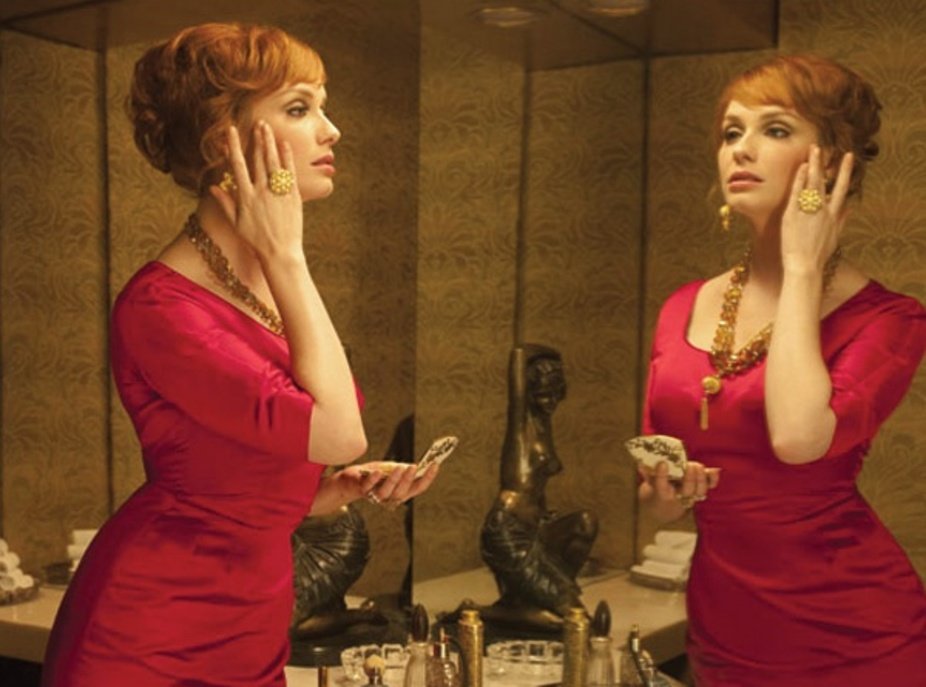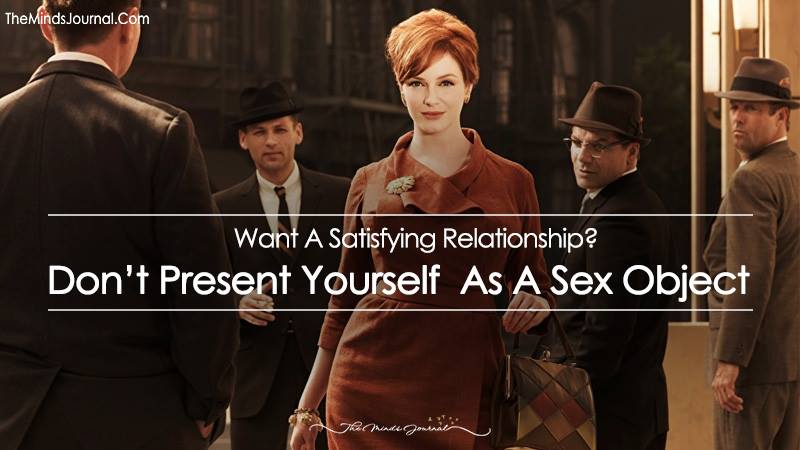If you want a satisfying relationship then never present yourself as a sex object to your partner.
When Joan Holloway – the bombshell office worker on the show “Mad Men” – enters a room, she knows she looks good and is going to turn heads. Every morning, Joan meticulously does her makeup and hair and puts on a skintight dress. The men in her office take notice and are quick with the catcalls and sexual comments.
Rather than becoming embarrassed or angry, for the most part, Joan finds the attention invigorating. Her hourglass figure is a source of power that she wields intentionally.
Male attention is welcome and men’s reactions seem largely innocuous. But her male coworkers’ reactions are objectifying and ultimately may not produce the empowerment Joan desires.

Objectification occurs when one person treats another like a thing or commodity, ignoring his or her humanity and dignity.
Objectifying a woman reduces her worth down to her physical appearance. It reflects the view that women’s bodies are objects of sexual pleasure without regard for the living, feeling, thinking people inhabiting them.
Read Objectifying Women Shames Everyone
Research has shown that objectification of women opens the door to a whole host of other issues, including not taking women’s work and accomplishments seriously, sexual violence, increased concerns about appearance and lower self-esteem.
Experiencing objectification from strangers may be particularly demeaning because unknown others never have the opportunity to dig deeper and truly know the woman as a person. But what happens when it happens within a close, romantic relationship?
A pervasive way of perceiving women
Unfortunately, objectification from many quarters is a common occurrence in women’s lives. To determine exactly how frequently American women perceive it happening, researchers contacted participants throughout the day via a smartphone app.

Young women reported experiencing objectification themselves an average of once every two days, most typically in the form of a sexual gaze – someone checking them out or staring at their bodies. The women reported seeing other women being objectified even more frequently, a little over once a day.
Perhaps due to its frequency, sexual objectification of women may seem normal. As a result, it’s seeped into many aspects of our world including advertisements, movies and television, and even the workforce, where women’s looks can dictate how they are treated.
According to objectification theory, women often take objectifying comments to heart and use them to evaluate themselves. As damaging as these comments and views can be, what does it mean for women when their romantic partners objectify them too?
Object of a partner’s affection
To address this question, psychologist Laura Ramsey and colleagues from Bridgewater State University conducted three studies to determine how being objectified by a male romantic partner affects women. If a woman enjoys being sexualized – like Joan from “Mad Men” – would objectification promote relationship satisfaction?
In the first study, the researchers recruited 114 women in heterosexual relationships: 9.6 percent dating, 28.9 percent steady partner, 8.8 percent engaged, 16.7 percent cohabitating and 36 percent married. They all responded to multiple prompts that fell into three categories.
Examples include, “I want men to look at me” (enjoyment of sexualization), “My partner often worries about whether the clothes I am wearing make me look good” (partner objectification) and “How well does your partner meet your needs” (relationship satisfaction).
Women whose responses indicated more partner objectification were less satisfied with their relationship – even when the women reported that they enjoyed being sexualized.
This suggests that despite liking sexualized attention, it may encourage objectification from a male partner, which may ultimately undermine the relationship.
Clearly those results sound bad for objectification. But it’s also possible that a male partner’s objectification is more innocent, merely his way of showing affection toward his adored female partner. If that’s the case, maybe objectification isn’t so bad, especially since other research shows that sexual desire in healthy relationships increases people’s happiness about them.
To explore the role of sexual desire in objectification, Ramsey and her colleagues asked 196 women to respond to the same three measures from the first study. Additionally, they asked the women about how much sexual desire they felt from their partner.
These results confirmed that feeling sexually desired by their partners did relate to greater relationship satisfaction. But feeling more desired didn’t relate to women enjoying sexualization more. Rather, feeling sexually desired went along with greater perceived objectification by the partner.
These findings suggest that feeling desired is not synonymous with objectification and each has different implications for satisfaction.
Feeling wanted by your partner is good for relationships; feeling like your body is the only thing that matters isn’t.
But what about the Joan Holloways of the world who knowingly emphasize their appearance and sexuality? Given the voluntary nature of their self-objectification, would any negative effects it had on the relationship be attenuated?
The researchers found that while women who self-objectify also enjoy sexualized attention from others, it doesn’t help their relationships. As before, enjoyment of sexualized attention coincides with objectification from the partner, which is associated with less relationship satisfaction.
In short, wanting sexualized attention seems to create an environment that fosters objectification. Unfortunately, greater objectification also means the relationship suffers.
Who’s to blame?
These surveys make clear that women who experience objectification from their male partners are less satisfied in their relationships.
On the surface, the solution seems simple: Men should avoid objectifying their female partners. But the research also indicates that men engage in objectification more when their partner likes being sexualized and when women objectify themselves. Intentionally or not, women who enjoy sexualized attention may seek out males who objectify them to fulfill that need.

Objectification is so pervasive in society – for instance, half of the advertisements sexualize women – that it’s tempting to think women should just embrace it and use it to their advantage. But the problem is that objectification ends up undermining women, not providing the empowerment they seek.
This research shows that holds true in the intimate confines of their romantic relationships, as well as at work and on the street.
As Joan from “Mad Men” knows, women should feel free to dress and act as they wish. But the research suggests it’s also important to be aware of how your partner reacts to your choices.
If your boyfriend’s or husband’s reaction involves objectifying remarks, don’t dismiss them merely as indicators of his sexual desire.
Read 7 Reasons Why Sex Is Important In A Relationship
Recognize objectification for the disrespectful thought process it is. Then identify more positive ways you both can express sexual desire. Ultimately that should lead to a happier and more satisfying relationship.










Leave a Reply